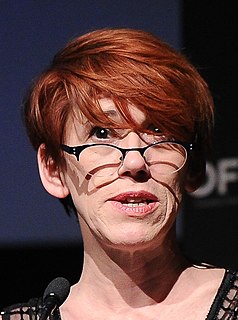A Quote by Khaled Hosseini
The experience of writing 'The Kite Runner' is one I will always think back on with fondness. There is an energy, a romance in writing the first novel that can never be duplicated again.
Related Quotes
When you first start writing-and I think it's true for a lot of beginning writers-you're scared to death that if you don't get that sentence right that minute it's never going to show up again. And it isn't. But it doesn't matter-another one will, and it'll probably be better. And I don't mind writing badly for a couple of days because I know I can fix it-and fix it again and again and again, and it will be better.
I'd never imagined myself writing at all until I was almost 30. And horror films weren't to my taste, at least the super popular (slasher-y) ones of the day back then. The first novel I ever loved as a kid was Frankenstein, and I was always a crazy Hitchcock and Polanski fan... but I never saw myself - a square spazzy girl from the suburbs - writing anything that would horrify anyone. Or so I thought.
If I'm writing a novel, I'll probably get up in the morning, do email, perhaps blog, deal with emergencies, and then be off novel-writing around 1.00pm and stop around 6.00pm. And I'll be writing in longhand, a safe distance from my computer. If I'm not writing a novel, there is no schedule, and scripts and introductions and whatnot can find themselves being written at any time and on anything.
Writing has to do with truth-telling. When you're writing, let's say, an essay for a magazine, you try to tell the truth at every moment. You do your best to quote people accurately and get everything right. Writing a novel is a break from that: freedom. When you're writing a novel, you are in charge; you can beef things up.
Objectifying your own novel while writing it never really helps. Instead, I guess while you're writing you need to think: This is the novel I want to write. And when you're done you need to think: This is what the novel I wanted to write feels like and reads like and looks like. Other people might call it sweeping or small, but it's the book you chose.
I have a process that I seem to always, to some degree, as a writer, adhere to, but I certainly have never imposed the way I write a novel on my students. When I had students, I never said, "You should never start writing a novel until you have the last sentence." I never did that, and I wouldn't do it now, but people now seem so interested in the process [of writing fiction] that I have to constantly make it clear when I describe mine that I'm not being prescriptive. I'm not proselytizing.




































